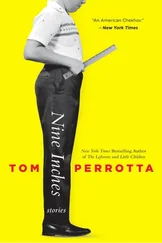Tom Perrotta - The Leftovers
Здесь есть возможность читать онлайн «Tom Perrotta - The Leftovers» весь текст электронной книги совершенно бесплатно (целиком полную версию без сокращений). В некоторых случаях можно слушать аудио, скачать через торрент в формате fb2 и присутствует краткое содержание. Год выпуска: 2011, ISBN: 2011, Жанр: Социально-психологическая фантастика, на английском языке. Описание произведения, (предисловие) а так же отзывы посетителей доступны на портале библиотеки ЛибКат.
- Название:The Leftovers
- Автор:
- Жанр:
- Год:2011
- ISBN:978-0-312-35834-1
- Рейтинг книги:3 / 5. Голосов: 1
-
Избранное:Добавить в избранное
- Отзывы:
-
Ваша оценка:
- 60
- 1
- 2
- 3
- 4
- 5
The Leftovers: краткое содержание, описание и аннотация
Предлагаем к чтению аннотацию, описание, краткое содержание или предисловие (зависит от того, что написал сам автор книги «The Leftovers»). Если вы не нашли необходимую информацию о книге — напишите в комментариях, мы постараемся отыскать её.
The Leftovers — читать онлайн бесплатно полную книгу (весь текст) целиком
Ниже представлен текст книги, разбитый по страницам. Система сохранения места последней прочитанной страницы, позволяет с удобством читать онлайн бесплатно книгу «The Leftovers», без необходимости каждый раз заново искать на чём Вы остановились. Поставьте закладку, и сможете в любой момент перейти на страницу, на которой закончили чтение.
Интервал:
Закладка:
Today’s event — the first annual Departed Heroes’ Day of Remembrance and Reflection, to be precise — wasn’t going to be anything like that. Kevin could sense the somber mood as soon as he arrived at the high school, the invisible haze of stale grief and chronic bewilderment thickening the air, causing people to talk more softly and move more tentatively than they normally would at a big outdoor gathering. On the other hand, he was both surprised and gratified by the turnout, given the cool reception the parade had received when it was first proposed. Some critics thought the timing was wrong (“Too soon!” they’d insisted), while others suggested that a secular commemoration of October 14th was wrongheaded and possibly blasphemous. These objections had faded over time, either because the organizers had done a good job winning over the skeptics, or because people just generally liked a parade, regardless of the occasion. In any case, so many Mapletonians had volunteered to march that Kevin wondered if there’d be anyone left to cheer them on from the sidelines as they made their way down Main Street to Greenway Park.
He hesitated for a moment just inside the line of police barricades, marshaling his strength for what he knew would be a long and difficult day. Everywhere he looked he saw broken people and fresh reminders of suffering. He waved to Martha Reeder, the once-chatty lady who worked the stamp window at the Post Office; she smiled sadly, turning to give him a better look at the homemade sign she was holding. It featured a poster-sized photograph of her three-year-old granddaughter, a serious child with curly hair and slightly crooked eyeglasses. ASHLEY, it said, MY LITTLE ANGEL. Standing beside her was Stan Washburn — a retired cop and former Pop Warner coach of Kevin’s — a squat, no-neck guy whose T-shirt, stretched tight over an impressive beer gut, invited anyone who cared to ASK ME ABOUT MY BROTHER. Kevin felt a sudden powerful urge to flee, to run home and spend the afternoon lifting weights or raking leaves — anything solitary and mindless would do — but it passed quickly, like a hiccup or a shameful sexual fantasy.
Expelling a soft dutiful sigh, he waded into the crowd, shaking hands and calling out names, doing his best impersonation of a small-town politician. An ex — Mapleton High football star and prominent local businessman — he’d inherited and expanded his family’s chain of supermarket-sized liquor stores, tripling the revenue during his fifteen-year tenure — Kevin was a popular and highly visible figure around town, but the idea of running for office had never crossed his mind. Then, just last year, out of the blue, he was presented with a petition signed by two hundred fellow citizens, many of whom he knew well: “We, the undersigned, are desperate for leadership in these dark times. Will you help us take back our town?” Touched by this appeal and feeling a bit lost himself — he’d sold the business for a small fortune a few months earlier, and still hadn’t figured out what to do next — he accepted the mayoral nomination of a newly formed political entity called the Hopeful Party.
Kevin won the election in a landslide, unseating Rick Malvern, the three-term incumbent who’d lost the confidence of the voters after attempting to burn down his own house in an act of what he called “ritual purification.” It didn’t work — the fire department insisted on extinguishing the blaze over his bitter objections — and these days Rick was living in a tent in his front yard, the charred remains of his five-bedroom Victorian hulking in the background. Every now and then, when Kevin went running in the early morning, he would happen upon his former rival just as he was emerging from the tent — one time bare-chested and clad only in striped boxers — and the two men would exchange an awkward greeting on the otherwise silent street, a Yo or a Hey or a What’s up? just to show there were no hard feelings.
As much as he disliked the flesh-pressing, backslapping aspect of his new job, Kevin felt an obligation to make himself accessible to his constituents, even the cranks and malcontents who inevitably came out of the woodwork at public events. The first to accost him in the parking lot was Ralph Sorrento, a surly plumber from Sycamore Road, who bulled his way through a cluster of sad-looking women in identical pink T-shirts and planted himself directly in Kevin’s path.
“Mr. Mayor,” he drawled, smirking as though there were something inherently ridiculous about the title. “I was hoping I’d run into you. You never answer my e-mails.”
“Morning, Ralph.”
Sorrento folded his arms across his chest and studied Kevin with an unsettling combination of amusement and disdain. He was a big, thick-bodied man with a buzz cut and a bristly goatee, dressed in grease-stained cargo pants and a thermal-lined hoodie. Even at this hour — it was not yet eleven — Kevin could smell beer on his breath and see that he was looking for trouble.
“Just so we’re clear,” Sorrento announced in an unnaturally loud voice. “I’m not paying that fucking money.”
The money in question was a hundred-dollar fine he’d been assessed for shooting at a pack of stray dogs that had wandered into his yard. A beagle had been killed on the spot, but a shepherd-lab mix had hobbled away with a bullet in its hind leg, dripping a three-block trail of blood before collapsing on the sidewalk not far from the Little Sprouts Academy on Oak Street. Normally the police didn’t get too exercised about a shot dog — it happened with depressing regularity — but a handful of the Sprouts had witnessed the animal’s agony, and the complaints of their parents and guardians had led to Sorrento’s prosecution.
“Watch your language,” Kevin warned him, uncomfortably aware of the heads turning in their direction.
Sorrento jabbed an index finger into Kevin’s rib cage. “I’m sick of those mutts crapping on my lawn.”
“Nobody likes the dogs,” Kevin conceded. “But next time call Animal Control, okay?”
“Animal Control.” Sorrento repeated the words with a contemptuous chuckle. Again he jabbed at Kevin’s sternum, fingertip digging into bone. “They don’t do shit.”
“They’re understaffed.” Kevin forced a polite smile. “They’re doing the best they can in a bad situation. We all are. I’m sure you understand that.”
As if to indicate that he did understand, Sorrento eased the pressure on Kevin’s breastbone. He leaned in close, his breath sour, his voice low and intimate.
“Do me a favor, okay? You tell the cops if they want my money, they’re gonna have to come and get it. Tell ’em I’ll be waiting for ’em with my sawed-off shotgun.”
He grinned, trying to look like a badass, but Kevin could see the pain in his eyes, the glassy, pleading look behind the bluster. If he remembered correctly, Sorrento had lost a daughter, a chubby girl, maybe nine or ten. Tiffany or Britney, a name like that.
“I’ll pass it along.” Kevin patted him gently on the shoulder. “Now, why don’t you go home and get some rest.”
Sorrento slapped at Kevin’s hand.
“Don’t fucking touch me.”
“Sorry.”
“Just tell ’em what I told you, okay?”
Kevin promised he would, then hurried off, trying to ignore the lump of dread that had suddenly materialized in his gut. Unlike some of the neighboring towns, Mapleton had never experienced a suicide by cop, but Kevin sensed that Ralph Sorrento was at least fantasizing about the idea. His plan didn’t seem especially inspired — the cops had bigger things to worry about than an unpaid fine for animal cruelty — but there were all sorts of ways to provoke a confrontation if you really had your heart set on it. He’d have to tell the chief, make sure the patrol officers knew what they were dealing with.
Читать дальшеИнтервал:
Закладка:
Похожие книги на «The Leftovers»
Представляем Вашему вниманию похожие книги на «The Leftovers» списком для выбора. Мы отобрали схожую по названию и смыслу литературу в надежде предоставить читателям больше вариантов отыскать новые, интересные, ещё непрочитанные произведения.
Обсуждение, отзывы о книге «The Leftovers» и просто собственные мнения читателей. Оставьте ваши комментарии, напишите, что Вы думаете о произведении, его смысле или главных героях. Укажите что конкретно понравилось, а что нет, и почему Вы так считаете.












